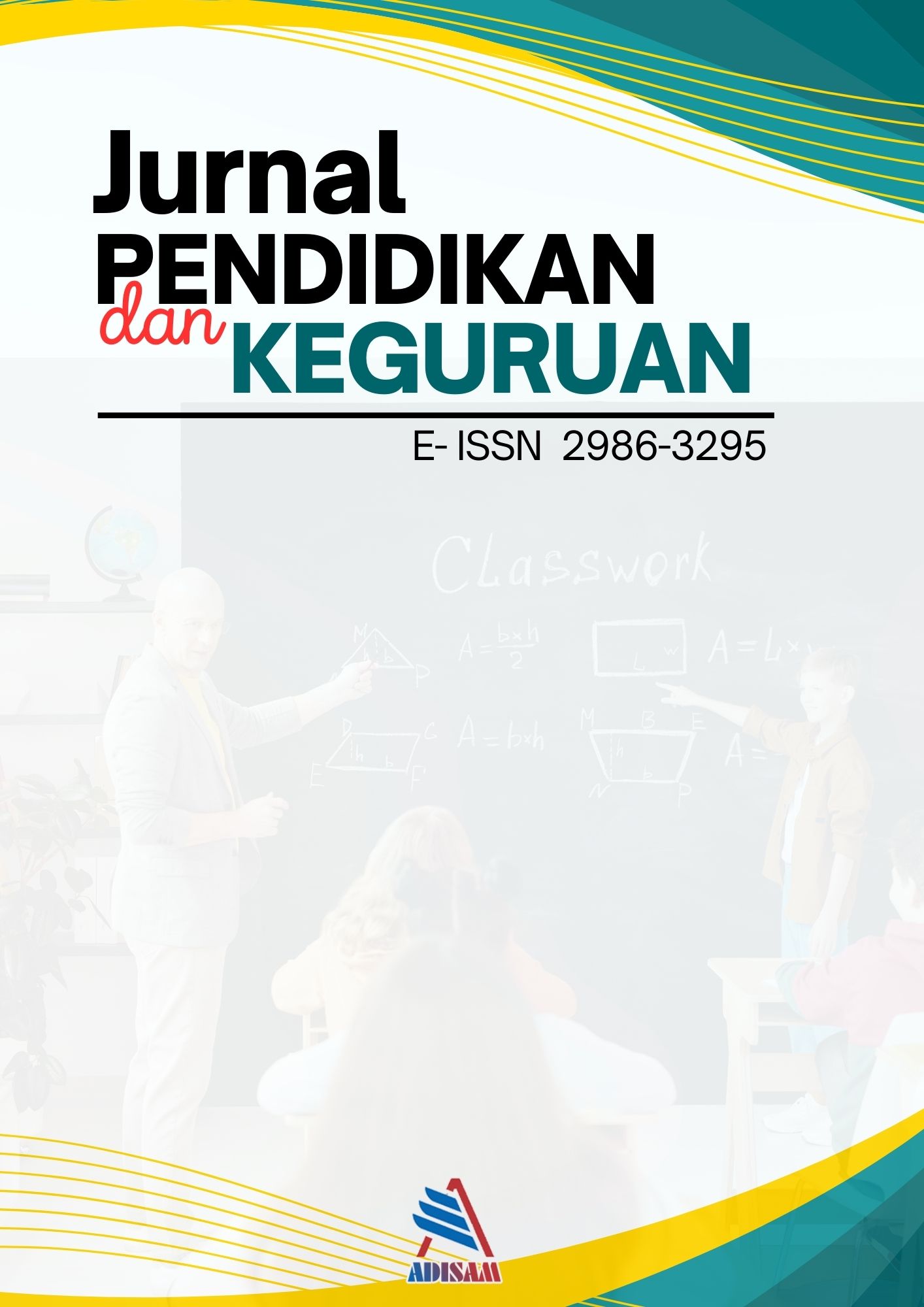OPTIMALISASI PERAN GURU PENDAMPING KHUSUS (GPK) DALAM MENERAPKAN PERMAINAN KOOPERATIF UNTUK MENINGKATKAN KETERAMPILAN SOSIAL ANAK DENGAN AUTISM SPECTRUM DISORDER (ASD) DI SD ISLAM AL MADANI BANJARBARU
Keywords:
Special assistant teacher, cooperative games, social skills, Autism Spectrum Disorder, inclusive educationAbstract
This study aims to describe the role of the Special Assistance Teacher (GPK) in implementing cooperative games to improve the social skills of children with Autism Spectrum Disorder (ASD) at SD Islam Al Madani Banjarbaru, and identify the challenges or obstacles faced in its implementation. Cooperative play is a learning approach that focuses on interaction and cooperation between individuals, which has been proven effective in stimulating the social skills of children with special needs, including children with ASD who generally experience barriers in social communication and mutual interaction. This research uses a descriptive qualitative approach with data collection techniques through observation, in-depth interviews, and documentation. The subjects in this study were GPKs who assisted students with ASD in the inclusive learning environment of SD Islam Al Madani Banjarbaru. The results showed that GPK has an important role that includes facilitating a safe and supportive play environment, accompanying children intensively during activities, providing emotional support, guiding the process of social interaction in the game, assessing children's social needs, and evaluating the development of social skills periodically. However, in its implementation, the GPK also faces various challenges, such as the GPK must adapt the game to the characteristics of ASD children, challenges in fostering children's interest in cooperative games, and limited learning facilities and media. Nevertheless, the support from the school, collaboration with class teachers and parents, as well as the enthusiasm and high concern of the GPK were the main supporting factors for the success of the intervention. This study concludes that the active role of GPK in implementing cooperative games contributes positively to the improvement of ASD children's social skills, and needs further support from both policy aspects and strengthening teacher capacity
Downloads
References
American Psychiatric Association. (2013). Diagnostic and Statistical Manual of Mental Disorders (5th ed.). Arlington, VA: APA.
Attwood, T. (2007). The Complete Guide to Asperger's Syndrome. Jessica Kingsley Publishers.
Bandura, A. (1986). Social Foundations of Thought and Action: A Social Cognitive Theory. Prentice Hall.
Case-Smith, J., & Arbesman, M. (2008). Evidence-based review of interventions for autism used in or of relevance to occupational therapy. American Journal of Occupational Therapy, 62(4), 416–429.
Febriyanti, T., & Suparmi. (2020). Peran Guru Pendamping Khusus dalam Pendidikan Inklusif. Jurnal Pendidikan Anak Berkebutuhan Khusus, 4(1), 67–74.
Friend, M., & Bursuck, W. D. (2012). Including Students with Special Needs: A Practical Guide for Classroom Teachers (6th ed.). Pearson.
Grandin, T. (2011). The Way I See It: A Personal Look at Autism and Asperger's. Future Horizons.
Gray, C. (2000). The New Social Story Book. Future Horizons.
Hasanah, Z., & Himami, A. (2021). Permainan Kooperatif dalam Pendidikan Anak Autis. Jurnal Intervensi Psikologi Anak, 6(2), 88–99.
Hidayati, N., & Ramadhani, D. (2023). Implementasi Permainan Kooperatif Untuk Meningkatkan Interaksi Sosial Anak Berkebutuhan Khusus. Jurnal Pendidikan Khusus Indonesia, 9(1), 45–58.
Miles, M. B., & Huberman, A. M. (1994). Qualitative Data Analysis: An Expanded Sourcebook (2nd ed.). Sage Publications.
Sugiyono. (2018). Metode Penelitian Kualitatif, Kuantitatif, dan R&D. Bandung: Alfabeta.
Mulyani, R. (2022). Peran lingkungan Inklusif dalam Membentuk Keterampilan Sosial Anak Autisme. Jurnal Kajian Pendidikan Khusus, 8(1), 59–70.
Putra, A. R. (2020). Peran Guru Pendamping dalam Pendidikan Inklusif. Jurnal Pendidikan Khusus, 16(2), 115–122.
Rahim, M., & Sari, R. M. (2021). Strategi Guru Pendamping Khusus dalam Meningkatkan Kemandirian Anak Autis. Jurnal Ilmiah Pendidikan Khusus, 9(1), 45–52.
Retnawati, H. (2014). Teori Respon Butir dan Penerapannya. Yogyakarta: Nuha Medika.
Rizky, R., Lestari, P., & Hidayat, T. (2021). Strategi Penguatan Positif dalam Pembelajaran Anak Autisme di Kelas Inklusif. Jurnal Psikologi Anak dan Pendidikan, 5(2), 89–97.
Sari, M. E., & Firmansyah, R. (2022). Analisis Perilaku Sosial Anak Autisme dalam Lingkungan Inklusif. Jurnal Ilmiah Pendidikan Khusus, 5(3), 201–213.
Simpson, R. L., & Myles, B. S. (2008). Educating Children and Youth with Autism: Strategies for Effective Practice. Pro-Ed.
Slameto. (2020). Belajar dan Faktor-faktor yang Mempengaruhinya. Jakarta: Rineka Cipta.
Sulastri, E. (2020). Perancangan Media Bermain Untuk Pengembangan Interaksi Sosial Anak Berkebutuhan Khusus. Jurnal Inovasi Pendidikan Khusus, 5(2), 77–88.
Tomlinson, C. A. (2014). The Differentiated Classroom: Responding to the Needs of All Learners (2nd ed.). ASCD.
Turnbull, A., Turnbull, R., & Wehmeyer, M. L. (2011). Exceptional Lives: Special Education in Today’s Schools (7th ed.). Pearson.
Vygotsky, L. S. (1978). Mind in society: The development of higher psychological processes. Cambridge, MA: Harvard University Press.
Wahyuni, A., & Sari, N. F. (2022). Peningkatan Keterampilan Sosial Melalui Metode Bermain Kooperatif Tipe Make A Match Pada Anak Usia Dini. Jurnal Obsesi: Jurnal Pendidikan Anak Usia Dini, 6(6), 6961–6969. https://doi.org/10.31004/obsesi.v6i6.2300
Woolfolk, A. (2015). Educational Psychology (13th ed.). Pearson Education.
Yuliani, T., & Anggraini, R. (2023). Strategi Intervensi Berbasis Bermain Untuk Anak ASD. Jurnal Edukasi Anak Berkebutuhan Khusus, 3(2), 142–157.
Zaini, M., & Aulya, F. (2023). Pengaruh Aktivitas Bermain Kelompok Terhadap Kemampuan Komunikasi Anak dengan ASD. Jurnal Pendidikan Anak Spesial, 6(1), 21–30.










